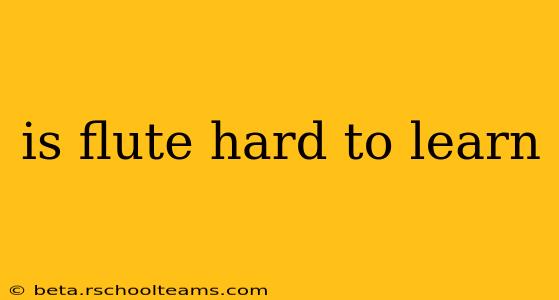Is Flute Hard to Learn? A Comprehensive Guide for Aspiring Flutists
The question of whether the flute is hard to learn is a common one, and the answer, like most things in life, is: it depends. While some find the flute relatively easy to pick up, others face significant challenges. This depends on a variety of factors, including natural aptitude, prior musical experience, practice habits, and the level of mastery you aim for.
Let's delve deeper into the aspects that influence the learning curve of the flute.
What Makes Learning the Flute Challenging?
Several aspects of flute playing present initial hurdles for beginners:
-
Embouchure: This refers to the way you hold your mouth and blow into the instrument. Developing a proper embouchure is crucial for producing a clear, consistent tone and is often the most challenging aspect for new players. It requires precise muscle control and takes time and dedicated practice to master.
-
Fingerings: The flute has a complex system of fingerings, and learning to coordinate your fingers accurately and quickly takes time and practice. Initially, many beginners struggle to transition smoothly between notes.
-
Breath Control: Producing a consistent and controlled airflow is essential for playing the flute effectively. Learning to control your breathing, particularly your diaphragm, is vital for achieving good tone and sustaining notes.
-
Maintenance: Flutes require regular cleaning and maintenance to keep them in optimal playing condition. This might involve cleaning the instrument after each playing session and periodically taking it for professional servicing. Neglecting maintenance can affect your tone and potentially damage the instrument.
What Makes Learning the Flute Easier?
Despite the challenges, many find the flute rewarding to learn, and certain aspects contribute to its accessibility:
-
Relatively Small Size and Portability: Compared to larger wind instruments like the tuba or bassoon, the flute is relatively small and easy to transport.
-
Visually Appealing: Many find the flute visually appealing, motivating them to practice and learn. This visual aspect can boost confidence and enhance the learning experience.
-
Wide Range of Music: The flute is used in many genres of music, from classical to jazz to pop, offering a rich and diverse repertoire for players to explore.
How Long Does it Take to Learn the Flute?
There's no single answer to this question. Progress depends on various factors, including:
-
Practice Time: Consistent, focused practice is crucial. Even short, regular sessions are more effective than infrequent, lengthy ones.
-
Instruction: Learning from a qualified teacher significantly accelerates the learning process. A teacher can provide personalized feedback, correct bad habits early on, and guide your progress effectively.
-
Natural Aptitude: Some individuals naturally pick up musical instruments more easily than others. This doesn't mean that others can't learn; it simply means that progress might vary.
Can Adults Learn the Flute?
Absolutely! While children might have an advantage in terms of muscle flexibility, adults can learn to play the flute with dedicated practice and proper instruction. Many adult learners find the process incredibly rewarding and enriching.
Is it Harder to Learn Than Other Instruments?
The difficulty of learning any instrument is subjective. Compared to instruments like the piano, which requires coordination between two hands, the flute might seem easier in some respects. However, the intricacies of embouchure and breath control present unique challenges. Ultimately, the "hardness" depends on individual aptitude, dedication, and teaching.
Conclusion:
Learning the flute, like learning any instrument, requires dedication, practice, and patience. While the challenges exist—particularly with embouchure and breath control—many find the rewards of playing the flute to be well worth the effort. With consistent practice and good instruction, anyone can learn to play the flute, regardless of age or prior musical experience. Start with realistic expectations, find a good teacher if possible, and enjoy the journey of musical discovery!
